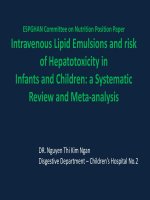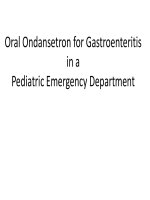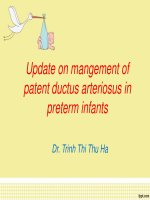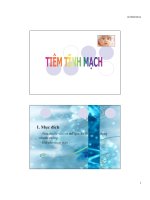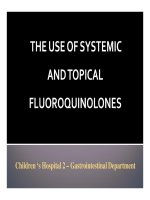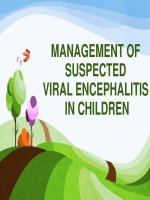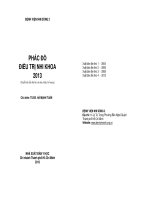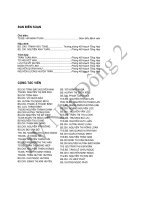Manegement of suspected viralencephalitis in children | Website Bệnh viện nhi đồng 2 - www.benhviennhi.org.vn
Bạn đang xem bản rút gọn của tài liệu. Xem và tải ngay bản đầy đủ của tài liệu tại đây (197.25 KB, 44 trang )
MANAGEMENT OF
SUSPECTED
VIRAL ENCEPHALITIS
IN CHILDREN
OVERVIEW
• 1980s: dramatically improved by
aciclovir HSV encephalitis in adults
• Delays treatment(> 48h after hospital
admission): associated with a worse
prognosis.
OVERVIEW
• Syndrome of neurological dysfunction:
inflammation of the brain parenchyma
• Many causes:
Infectious: viruses, bacteria, parasites and
fungi
Non- infectious: antibody-mediated
RECOMMENDATION
• Which clinical features should lead to a
suspicion of encephalitis in children?
RECOMMENDATION
• Current or recent febrile illness: altered behaviour,
personality, cognition or consciousness, seizures or
new focal neurological signs (A, II)
• The differential diagnosis: metabolic, toxic,
autoimmune causes or sepsis outside the CNS (B,
III), past history is very important
• Sub-acute (weeks to months) encephalitis:
autoimmune, paraneoplastic, metabolic aetiologies
(C, III)
• Priority of the investigations: determined by clinical
history and clinical presentation (C, III)
RECOMMENDATION
• Diagnostic features for specific
aetiologies?
Age
Immunocompetence
Geography
Exposure.
HSV encephalitis
RECOMMENDATION
• Symptom: non – specific
• Children: labial – herpes is diagnostic specific
(develop encephalitis with primary HSV
infection)
• Acute opercular syndrome (disturbance of
voluntary control of the facio-linguo-glossopharyngeal muscles leading to oro-facial
palsy, dysarthria and dysphagia)
• Sexual abuse
• Varicella zoster encephalitis
RECOMMENDATION
• Acute/sub-acute: fever, headache, altered
consciousness, ataxia and seizures
• Post-infective immunemediated cerebellitis (1
week to 48 months)
• Acute infective viral encephalitis or a
vasculopathy
• hydrocephalus secondary
• PCR/IgG in CSF
EBV encephalitis
RECOMMENDATION
• Teenagers
• Altered level of consciousness,
seizures and visual hallucinations
RECOMMENDATION
• Encephalitis associated with
respiratory illnesses: influenza viruses,
paramyxoviruses, bacterium M.
pneumoniae.
RECOMMENDATION
• Rashes: Rickettsial, measles virus
(acute/sub-acute)
• HHV6 (and possibly HHV7):
< 2 years old
severe disease, sequelae far beyond.
Ataxia, prolonged convulsions,
gastrointestinal symptoms, high fever
and rash systemically
• Which patients with suspected
encephalitis should have a lumbar
puncture (LP), and in which should this
be preceded by a CTscan?
RECOMMENDATION
• Suspected encephalitis: LP as soon as
possible, unless there is a clinical
contraindication (A, II)
• Clinical assessment and not cranial CT
should be used to determine if it is
safe to perform a LP (A, II)
• What information should be gathered
from the LP?
RECOMMENDATION
• Opening pressure (A, II)
• Total and differential white cell count, culture and
sensitivities for bacteria (A, II)
• Protein, lactate and glucose (A, II)
• A sample: sent and stored for virological investigations
or other future investigation (A, II)
• Culture for Mycobacterium tuberculosis when clinically
indicated (A, II)
• If have strong clinical diagnosis, but CSF results are
normal, a second LP should be repeat (consideration
for antibody detection) (A, II)
• What virological investigations should
be performed?
RECOMMENDATION
• Suspected encephalitis: CSF PCR test
for HSV (1 and 2), VZV and
enteroviruses (identify 90% of known
viral cases) and EBV considered (B, II)
• Further testing: guided by the clinical
features (travel history and animal or
insect contact (B, III)
• What antibody testing should be done
on serum & CSF?
RECOMMENDATION
• Suspected encephalitis: PCR of CSF
was not performed acutely, a later CSF
sample (at approximately 10-14 days
after onset) should be sent (for HSV
specific IgG antibody testing (B, III)
• Avivirus encephalitis: CSF: tested for
IgM antibody (B, II)
• What PCR/culture should be done on
other samples (e.g. throat swab, stool,
vesicle etc)?
